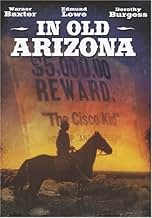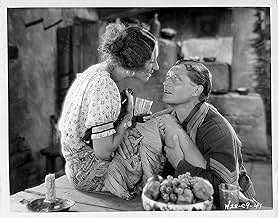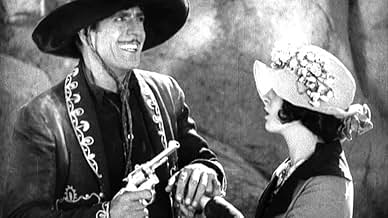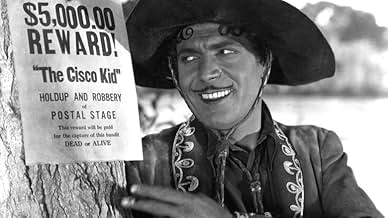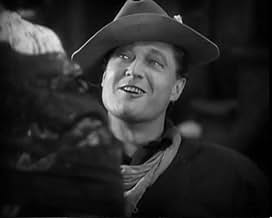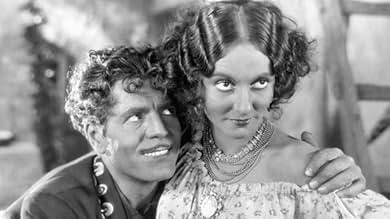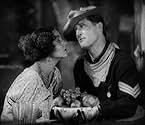ÉVALUATION IMDb
5,5/10
1,4 k
MA NOTE
Ajouter une intrigue dans votre langueA charming, happy-go-lucky bandit in old Arizona plays cat-and-mouse with the sheriff trying to catch him while he romances a local beauty.A charming, happy-go-lucky bandit in old Arizona plays cat-and-mouse with the sheriff trying to catch him while he romances a local beauty.A charming, happy-go-lucky bandit in old Arizona plays cat-and-mouse with the sheriff trying to catch him while he romances a local beauty.
- A remporté 1 oscar
- 4 victoires et 4 nominations au total
Henry Armetta
- Barber
- (uncredited)
James Bradbury Jr.
- Soldier
- (uncredited)
Frank Campeau
- Man Chasing Cisco
- (uncredited)
John Webb Dillion
- Second Soldier
- (uncredited)
Alphonse Ethier
- Sheriff
- (uncredited)
Jim Farley
- Townsman
- (uncredited)
William Gillis
- Guard
- (uncredited)
Pat Hartigan
- Cowpuncher
- (uncredited)
Soledad Jiménez
- Tonita the Cook
- (uncredited)
Ivan Linow
- Russian Immigrant
- (uncredited)
Tom London
- Man in Saloon
- (uncredited)
Helen Lynch
- Stagecoach Passenger
- (uncredited)
J. Farrell MacDonald
- Stage Passenger
- (uncredited)
Julius Viggo Madsen
- Tenor in Quartet
- (uncredited)
Avis en vedette
This is likely the first sound western film as well as the first sound film done out-of-doors. Suggested by "The Caballero's Way", a short story by William Sidney Porter (O.Henry), the main character, "The Cisco Kid", has been considerably upgraded. Porter's "Kid" was a ruthless bandit who didn't like people who got in his way, especially sheriffs. When a sheriff seduced the "Kid's" girl-friend into betraying him into an ambush, the "Kid", ruthlessly clever, took his revenge in a sadistic fashion. In case one might want to read the story, I will say no more. In the film, the "Kid" is a bandit right enough, but a sympathetic one, and sufficiently clever to outwit a sheriff who persuades the girlfriend to disarm the "Kid". She does this by charming him into taking off his gun when he meets her for a tryst. Don't worry, the "Kid" is one up on this trick, too, but protects himself in somewhat gentler fashion than in the story. If one could view this film today it would seem a museum piece, but not without some pictorial charm. I remember the photography as very pictorial, as with some later sequels, and there is a scene of bacon frying over a campfire that rather startled 1929 film goers with the realistic sound.
I have heard so much about In Old Arizona that I truly was anticipating a genuine 'western' experience since this was a Fox film . I know the production values and story lines in their silents were always entertaining . I kept waiting for a western but it never came .
One has to be able to be able to imagine the newness of sound to comprehend the audience reaction to this film at its release . The frying bacon scene has been recounted in several different publications . The newness of sound was evident throughout the picture with songs , continual dialogue (sometimes very inane ) , sound effects ,etc. The film tried to overload the senses of the viewers with sound that seemed to come in waves to awe the viewers.
The direction receiving an Academy nomination escapes me completely . It appeared the director knew it was sound , but used tried and true 'silent ' techniques . The constant smiling , grinning and bon vivant attitude of Baxter was reminiscent of second tier silent western stars ala Buddy Roosevely , Wally Wales ,Bill Cody , Bob Custer et al. They all used this carefree , devil-may care attitude constantly .
Probably the most noticeable 'throwback ' methods were the exchange between Baxter and Burgess at the end . Both had a double meaning for their phrases which could have translated into a very delightful scene . However both of them resorted to 'silent' facial expressions that let the audience in on the meaning , but not the other character . Cummings showed his lack of knowledge and faith in sound as well as subtlety in expressions , but it understandable given his background and the newness of sound.
Baxter handled himself very well , yet you wonder if the Oscar was for the sound element tied to his performance rather than the strength of his acting alone . He always did a creditable job in any picture . Burgess is another story . Her attempt to portray herself as a Hispanic vamp left a lot to be desired . Still you cannot help but see the definite ' borrowing ' for Pearl Chavez in Duel in the Sun . There is no mistaking the copy that Jones used .
Finally , the O. Henry ending for the film was a little different . You reap what you sow is very prevalent in Edmund Lowe and Burgess . They sowed deceit and reaped their just desserts . However , Baxter just goes on his outlaw ways with no consequences . He admits it will come one day for him, but we don't see it . So there is morality and amorality . Where there is no dialogue , I was fascinated how some outdoor scenes took on a John Ford Monument Valley look .
The scene where Burgess goes into the saloon to meet Lowe is priceless . She walks in and she and a customer start exchanging ' let's do business ' glances . Then she meets Lowe and begins to condemn the women who work there and castigates Lowe for comparing her to them . Her self-righteous air is her best piece of acting in the entire movie.
You knew this was precode with some of the dialogue . When Baxter tells Lowe he is known as " Conejito " , Lowe 's line asking ' is he that fast' is priceless . The allusions abound .
Still this is well worth the time to view . First for the historical as to the use of sound . Then there is the introduction of the Cisco Kid . You have to have this film to trace the evolution of the character in film . When Baxter was talking about Yaqui being his best friend , you almost expected a pan to Pancho based upon preconditioning to the pair .
The morality and the love triangle dominate this film . There is no issue to be resolved as none ever existed . You have a story of 3 people - interesting , but slow moving and slower developing . Glad I own it and watched it
One has to be able to be able to imagine the newness of sound to comprehend the audience reaction to this film at its release . The frying bacon scene has been recounted in several different publications . The newness of sound was evident throughout the picture with songs , continual dialogue (sometimes very inane ) , sound effects ,etc. The film tried to overload the senses of the viewers with sound that seemed to come in waves to awe the viewers.
The direction receiving an Academy nomination escapes me completely . It appeared the director knew it was sound , but used tried and true 'silent ' techniques . The constant smiling , grinning and bon vivant attitude of Baxter was reminiscent of second tier silent western stars ala Buddy Roosevely , Wally Wales ,Bill Cody , Bob Custer et al. They all used this carefree , devil-may care attitude constantly .
Probably the most noticeable 'throwback ' methods were the exchange between Baxter and Burgess at the end . Both had a double meaning for their phrases which could have translated into a very delightful scene . However both of them resorted to 'silent' facial expressions that let the audience in on the meaning , but not the other character . Cummings showed his lack of knowledge and faith in sound as well as subtlety in expressions , but it understandable given his background and the newness of sound.
Baxter handled himself very well , yet you wonder if the Oscar was for the sound element tied to his performance rather than the strength of his acting alone . He always did a creditable job in any picture . Burgess is another story . Her attempt to portray herself as a Hispanic vamp left a lot to be desired . Still you cannot help but see the definite ' borrowing ' for Pearl Chavez in Duel in the Sun . There is no mistaking the copy that Jones used .
Finally , the O. Henry ending for the film was a little different . You reap what you sow is very prevalent in Edmund Lowe and Burgess . They sowed deceit and reaped their just desserts . However , Baxter just goes on his outlaw ways with no consequences . He admits it will come one day for him, but we don't see it . So there is morality and amorality . Where there is no dialogue , I was fascinated how some outdoor scenes took on a John Ford Monument Valley look .
The scene where Burgess goes into the saloon to meet Lowe is priceless . She walks in and she and a customer start exchanging ' let's do business ' glances . Then she meets Lowe and begins to condemn the women who work there and castigates Lowe for comparing her to them . Her self-righteous air is her best piece of acting in the entire movie.
You knew this was precode with some of the dialogue . When Baxter tells Lowe he is known as " Conejito " , Lowe 's line asking ' is he that fast' is priceless . The allusions abound .
Still this is well worth the time to view . First for the historical as to the use of sound . Then there is the introduction of the Cisco Kid . You have to have this film to trace the evolution of the character in film . When Baxter was talking about Yaqui being his best friend , you almost expected a pan to Pancho based upon preconditioning to the pair .
The morality and the love triangle dominate this film . There is no issue to be resolved as none ever existed . You have a story of 3 people - interesting , but slow moving and slower developing . Glad I own it and watched it
Despite the desert setting and saloons and the presence of a Mexican bandit, cavalry officers and senoritas, this is really an exotic romantic drama (based on a story by the renowned O. Henry) as opposed to a straight Western. Being an early Talkie, it's obviously creaky with very dated acting but retains plenty of interest for the non-casual film-buff even after all these years: for one thing, it basically served as a template for the myriad Westerns that followed involving the exploits of some famous bandit or other (beginning with King Vidor's BILLY THE KID [1930]); besides, the flirtatious character of Dorothy Burgess may well have inspired Linda Darnell's Chihuahua in John Ford's classic MY DARLING CLEMENTINE (1946) nearly twenty years later!
Warner Baxter was a popular star of the era who has been largely neglected over the years; his Oscar-winning performance here isn't bad, but seems hardly outstanding at this juncture his talent is more readily evident, in fact, in such later films as 42ND STREET (1933) and John Ford's THE PRISONER OF SHARK ISLAND (1936). The same can be said of Edmund Lowe: if he's at all remembered today, it's for his "Quirt & Flagg" series of war films with Victor McLaglen (three of them helmed by this film's original director, Raoul Walsh), the Bela Lugosi vehicle CHANDU THE MAGICIAN (1932; in the title role), and the noir-ish gangster drama DILLINGER (1945). While his character curiously speaks in modern i.e. 1920s slang, he interacts well with both Baxter and Burgess especially effective is the scene where he comes face to face with Baxter's Cisco Kid at a barber shop and, ignorant of the latter's identity, lets him slip away.
The film features a couple of songs (one of them, by the famed songwriting trio of DeSylva-Brown-Henderson, is heard several times throughout and even serves as an Overture to the feature proper) and archaic comedy relief by a number of minor characters notably Burgess' long-suffering elderly maid. There's far more talk than action here, but the twist ending (subsequently much copied) is remarkable if anything, because it's unexpectedly pitiless for a film of its era! Incidentally, the lead role was to have been played by Raoul Walsh himself but he was injured (eventually losing an eye) in a driving accident; Irving Cummings replaced him behind the cameras (and, oddly enough, alone received the Best Director nomination, despite Walsh's name still appearing in the credits)!
P.S. Baxter, Lowe and director Cummings were re-united shortly after for a sequel THE CISCO KID (1930); one wonders whether copies of the film still exist as, ideally, it should have been paired with the original on the bare-bones Fox DVD...
Warner Baxter was a popular star of the era who has been largely neglected over the years; his Oscar-winning performance here isn't bad, but seems hardly outstanding at this juncture his talent is more readily evident, in fact, in such later films as 42ND STREET (1933) and John Ford's THE PRISONER OF SHARK ISLAND (1936). The same can be said of Edmund Lowe: if he's at all remembered today, it's for his "Quirt & Flagg" series of war films with Victor McLaglen (three of them helmed by this film's original director, Raoul Walsh), the Bela Lugosi vehicle CHANDU THE MAGICIAN (1932; in the title role), and the noir-ish gangster drama DILLINGER (1945). While his character curiously speaks in modern i.e. 1920s slang, he interacts well with both Baxter and Burgess especially effective is the scene where he comes face to face with Baxter's Cisco Kid at a barber shop and, ignorant of the latter's identity, lets him slip away.
The film features a couple of songs (one of them, by the famed songwriting trio of DeSylva-Brown-Henderson, is heard several times throughout and even serves as an Overture to the feature proper) and archaic comedy relief by a number of minor characters notably Burgess' long-suffering elderly maid. There's far more talk than action here, but the twist ending (subsequently much copied) is remarkable if anything, because it's unexpectedly pitiless for a film of its era! Incidentally, the lead role was to have been played by Raoul Walsh himself but he was injured (eventually losing an eye) in a driving accident; Irving Cummings replaced him behind the cameras (and, oddly enough, alone received the Best Director nomination, despite Walsh's name still appearing in the credits)!
P.S. Baxter, Lowe and director Cummings were re-united shortly after for a sequel THE CISCO KID (1930); one wonders whether copies of the film still exist as, ideally, it should have been paired with the original on the bare-bones Fox DVD...
"In Old Arizona" was made in 1928 at a time when sound was still a novelty in films. As such you can see in this film sequences that purely demonstrate sound but add nothing to the story. For example, in the opening scene after the stagecoach leaves, the camera moves to a mariachi band that appears out of nowhere to play a song, and later a scene begins with a quartet warbling a little ditty before moving over to the principle characters.
The story centers on the Cisco Kid (Warner Baxter) who is a likable rogue who robs stagecoaches (but not the passengers) and has a price on his head of $5,000. It seems that everyone knows the kid on sight except the town barber. His girlfriend Tonia Maria (Dorothy Burgess) is an obvious pre-production code prostitute, who "entertains" him when he is not robbing stagecoaches.
The army is asked to do something about all of the robberies. They send Sgt. Mickey Dunn (Edmund Lowe) to investigate. Along the way he meets Tonia Maria who seduces him (off screen of course) and the two plot to capture the Kid and claim the reward. Naturally the Kid uncovers the plot and prepares a surprise for the sergeant and his unfaithful girlfriend.
This film is rather dated when watched today. It is over talkative and has just awful acting in many of the supporting roles, particularly the actor who plays the stagecoach driver. But you have to remember that this was the first year of sound movies. Director Raoul Walsh used outdoor microphones for the first time in a major studio production. You'll notice a few "silent spots" in the out door scenes.
The three leads are OK but the Mexican "accents" of Baxter and Burgess are laughable. Actually as hard to believe as it was, Baxter won the 1929 Academy Award for his role. Walsh was supposed to play the Lowe part but lost an eye in an accident about this time.
J. Farrell MacDonald appears early in the film as an Irish stagecoach passenger.
The story centers on the Cisco Kid (Warner Baxter) who is a likable rogue who robs stagecoaches (but not the passengers) and has a price on his head of $5,000. It seems that everyone knows the kid on sight except the town barber. His girlfriend Tonia Maria (Dorothy Burgess) is an obvious pre-production code prostitute, who "entertains" him when he is not robbing stagecoaches.
The army is asked to do something about all of the robberies. They send Sgt. Mickey Dunn (Edmund Lowe) to investigate. Along the way he meets Tonia Maria who seduces him (off screen of course) and the two plot to capture the Kid and claim the reward. Naturally the Kid uncovers the plot and prepares a surprise for the sergeant and his unfaithful girlfriend.
This film is rather dated when watched today. It is over talkative and has just awful acting in many of the supporting roles, particularly the actor who plays the stagecoach driver. But you have to remember that this was the first year of sound movies. Director Raoul Walsh used outdoor microphones for the first time in a major studio production. You'll notice a few "silent spots" in the out door scenes.
The three leads are OK but the Mexican "accents" of Baxter and Burgess are laughable. Actually as hard to believe as it was, Baxter won the 1929 Academy Award for his role. Walsh was supposed to play the Lowe part but lost an eye in an accident about this time.
J. Farrell MacDonald appears early in the film as an Irish stagecoach passenger.
How the heck do you rate this movie?
In its day it might have gotten a 9 or 10; but if this were a contemporary movie, perhaps a 2 or 3, with points for cinematography and a decent plot. Compare it to the Marx Brothers' The Cocoanuts - 1929, which is far more entertaining, though the acting is also rather rough, and the plot ... what plot?
The acting is sometimes quite bizarre, with very wide-eyed expressions and rapid gesticulation. It is overacting that is an obvious remnant from the silent days. The dialogue is mostly rough. The Cisco Kid's is good, but the rest sounds stilted. Oddly, the captain is generally not overacting, and seems to be ad libbing his lines, but they still don't seem realistic, though they are interesting. Are his expressions accurate to the 1890s or the 1920s? Either way, it is an interesting fly in the amber.
I can imagine the studio heads, perhaps watching the audience reaction, saying, hey, maybe we need to hire real actors? But the key players went on to successful careers, so the fault seems to lie with the direction.
Accents? Was there, is there an Arizona accent? For some unknown reason, Sergeant Mickey Dunn talks with a fake New Yawk accent (he is the only one that I noticed). In the O. Henry story, there is no mention of being from NYC. And Edmund Lowe was born in San Jose, Calif., so it was presumably Raoul Walsh's decision. Oh, and Lowe taught English and elocution before becoming an actor, so don't blame Lowe. Perhaps it had something to do with NYC having the special sound on film projectors needed to show the film?
What they did with sound was nothing short of astonishing for the time. The opening scene of ringing the bells shows the sound syncing, and also a lack of speed fluctuation - wow and flutter. There is a lot of ambient sound in the movie, but because of modern noise reduction anything too far off is usually inaudible in the remastered sound track. There are points where an actor leans over into a hidden mic, perhaps accidentally. There are only one or two moments where an actor fades to inaudibility.
All this is astonishing for location shooting long before tape recording. Perhaps the coolest part is filming the sound of the old Edison cylinder phonograph, the best they could do for providing a musical sound track at the time. This was the first film with an optical sound track, and it clearly is the reason it became the dominant system until magnetic sound tracks decades later. Watch The Cocoanuts to hear the problems with sound on disk films -- the sound quality varies a lot through the film.
The film is set somewhere between 1897 and 1901, as there is a line mentioning President McKinley, but the setting seems older. This makes it only about 30 years before the date of the film. Does 1983 sound like the olden days to us? Their sense of the passage of time seems different from ours (see the nostalgic Meet Me in St. Louis, for example), but why? Was it a shorter lifespan, or more rapid, dramatic technological progress? Those 30 years saw the invention of airplanes, automobiles, highways, buses and trucks, radio, moving pictures, and now talking pictures. The 19th century must have seemed long ago.
The best part about In Old Arizona is the cinematography. Not only are the scenics beautiful, but the buildings are full of character, as though it was filmed in Daguerrotypes.
I love old movies, perhaps because they were so hard to find. Growing up outside of New York City, there were several independent TV stations that showed old movies, though in the Sixties, that would have meant movies from the Fifties and Forties -- 10 to 20 years old! The best way to see old movies was to watch the Late Show on WCBS channel 2, which as I recall usually started around 11:30 p.m. When that movie was over, they would show an even older movie on the Late Late Show, perhaps around 2:30 a.m., always introduced by Leroy Anderson's The Syncopated Clock.
If the first two movies were short, there might be an even older movie on the Late Late Late Show, perhaps starting around 3:30 or 4 a.m. That is where I would have seen In Old Arizona, on the time slot for people with acute insomnia, a real challenge for a kid to stay up for. But I probably encountered it as a kid, amazed puzzlement that anything so ancient had ever been put on film, as though my TV had been turned into a time machine. (And for those early risers, next was the Sunrise Semester, Sunrise Sermon, or The Modern Farmer, depending on the day.) Now it is my computer that is the time machine.
There are some very old movies that I like to watch now and then, such as International House or Duck Soup. But I doubt I will ever watch In Old Arizona again, except perhaps in 15 years, 2028, when the movie turns 100. It will probably put me to sleep. It almost did this time.
In its day it might have gotten a 9 or 10; but if this were a contemporary movie, perhaps a 2 or 3, with points for cinematography and a decent plot. Compare it to the Marx Brothers' The Cocoanuts - 1929, which is far more entertaining, though the acting is also rather rough, and the plot ... what plot?
The acting is sometimes quite bizarre, with very wide-eyed expressions and rapid gesticulation. It is overacting that is an obvious remnant from the silent days. The dialogue is mostly rough. The Cisco Kid's is good, but the rest sounds stilted. Oddly, the captain is generally not overacting, and seems to be ad libbing his lines, but they still don't seem realistic, though they are interesting. Are his expressions accurate to the 1890s or the 1920s? Either way, it is an interesting fly in the amber.
I can imagine the studio heads, perhaps watching the audience reaction, saying, hey, maybe we need to hire real actors? But the key players went on to successful careers, so the fault seems to lie with the direction.
Accents? Was there, is there an Arizona accent? For some unknown reason, Sergeant Mickey Dunn talks with a fake New Yawk accent (he is the only one that I noticed). In the O. Henry story, there is no mention of being from NYC. And Edmund Lowe was born in San Jose, Calif., so it was presumably Raoul Walsh's decision. Oh, and Lowe taught English and elocution before becoming an actor, so don't blame Lowe. Perhaps it had something to do with NYC having the special sound on film projectors needed to show the film?
What they did with sound was nothing short of astonishing for the time. The opening scene of ringing the bells shows the sound syncing, and also a lack of speed fluctuation - wow and flutter. There is a lot of ambient sound in the movie, but because of modern noise reduction anything too far off is usually inaudible in the remastered sound track. There are points where an actor leans over into a hidden mic, perhaps accidentally. There are only one or two moments where an actor fades to inaudibility.
All this is astonishing for location shooting long before tape recording. Perhaps the coolest part is filming the sound of the old Edison cylinder phonograph, the best they could do for providing a musical sound track at the time. This was the first film with an optical sound track, and it clearly is the reason it became the dominant system until magnetic sound tracks decades later. Watch The Cocoanuts to hear the problems with sound on disk films -- the sound quality varies a lot through the film.
The film is set somewhere between 1897 and 1901, as there is a line mentioning President McKinley, but the setting seems older. This makes it only about 30 years before the date of the film. Does 1983 sound like the olden days to us? Their sense of the passage of time seems different from ours (see the nostalgic Meet Me in St. Louis, for example), but why? Was it a shorter lifespan, or more rapid, dramatic technological progress? Those 30 years saw the invention of airplanes, automobiles, highways, buses and trucks, radio, moving pictures, and now talking pictures. The 19th century must have seemed long ago.
The best part about In Old Arizona is the cinematography. Not only are the scenics beautiful, but the buildings are full of character, as though it was filmed in Daguerrotypes.
I love old movies, perhaps because they were so hard to find. Growing up outside of New York City, there were several independent TV stations that showed old movies, though in the Sixties, that would have meant movies from the Fifties and Forties -- 10 to 20 years old! The best way to see old movies was to watch the Late Show on WCBS channel 2, which as I recall usually started around 11:30 p.m. When that movie was over, they would show an even older movie on the Late Late Show, perhaps around 2:30 a.m., always introduced by Leroy Anderson's The Syncopated Clock.
If the first two movies were short, there might be an even older movie on the Late Late Late Show, perhaps starting around 3:30 or 4 a.m. That is where I would have seen In Old Arizona, on the time slot for people with acute insomnia, a real challenge for a kid to stay up for. But I probably encountered it as a kid, amazed puzzlement that anything so ancient had ever been put on film, as though my TV had been turned into a time machine. (And for those early risers, next was the Sunrise Semester, Sunrise Sermon, or The Modern Farmer, depending on the day.) Now it is my computer that is the time machine.
There are some very old movies that I like to watch now and then, such as International House or Duck Soup. But I doubt I will ever watch In Old Arizona again, except perhaps in 15 years, 2028, when the movie turns 100. It will probably put me to sleep. It almost did this time.
Le saviez-vous
- AnecdotesThe first all-talking, sound-on-film feature shot outdoors.
- GaffesWhen Cisco robs the stagecoach, he is wearing an army holster (flap-over), the same type the Sergeant wears. But for the rest of the movie, he wears an open holster.
- Citations
[last lines]
The Cisco Kid: Her flirting days are over. And she's ready to settle down.
- ConnexionsFeatured in The Soundman (1950)
- Bandes originalesMy Tonia
Words and Music by Buddy G. DeSylva (as DeSylva), Lew Brown (as Brown) and Ray Henderson (as Henderson)
Sung by Warner Baxter (uncredited)
Meilleurs choix
Connectez-vous pour évaluer et surveiller les recommandations personnalisées
- How long is In Old Arizona?Propulsé par Alexa
Détails
- Date de sortie
- Pays d’origine
- Langues
- Aussi connu sous le nom de
- The Cisco Kid
- Lieux de tournage
- San Fernando Valley, Los Angeles, Californie, États-Unis(outdoor riding)
- société de production
- Consultez plus de crédits d'entreprise sur IMDbPro
Box-office
- Brut – États-Unis et Canada
- 2 834 000 $ US
- Durée1 heure 35 minutes
- Couleur
Contribuer à cette page
Suggérer une modification ou ajouter du contenu manquant

